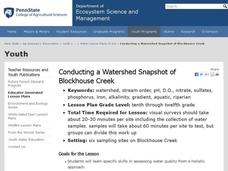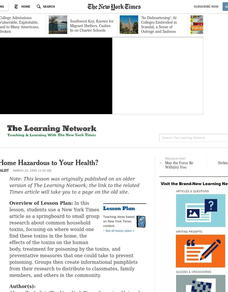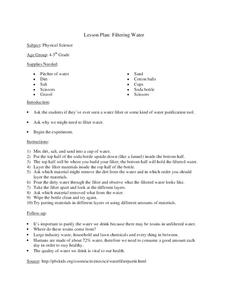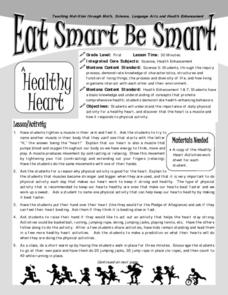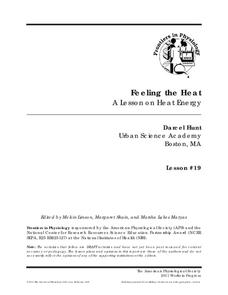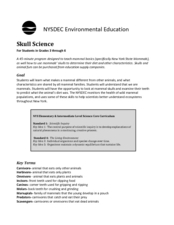Curated OER
Human Body Series - Cardiovascular System
Pump up your class while studying the cardiovascular system with this pair of activities. In one, learners record heart rates during different actions. In the second, they read kid-friendly heart health articles online and then write a...
Curated OER
"Conducting a Watershed Snapshot of Blockhouse Creek"
Students examine specific skills in assessing water quality from a holistic approach. They assess the health of a local watershed and identify problems in the local watershed and suggest remediation.
Baylor College
Fuel for Living Things
During a three-part lesson, learners make a cabbage juice pH indicator and use it to analyze the waste products of yeast after feeding them with sugar. The intent is to demonstrate how living organisms produce carbon dioxide, which is...
Baylor College
What Dissolves in Water?
One of water's claims to fame is as the universal solvent. Young physical scientists experiment to discover which materials dissolve in this special compound. You could never be more prepared for teaching this lesson than by using this...
Baylor College
How Can We Find Out What Is in Water?
Using paper chromatography, water watchers discover that several substances might be dissolved even though they aren't visible. In this case, you will prepare a mixture of three different food colorings for them to experiment with. A...
Curated OER
Is Your Home Hazardous to Your Health?
Students use a newspaper article as a springboard to small group research about common household toxins, focusing on where would one find these toxins in the home, the effects of the toxins on the human body and treatment for poisoning...
Curated OER
Filtering Water
Students investigate the need for filtered water. In this filtered water lesson, students explore the health hazards posed from consuming unfiltered water. Students construct a water filtration device.
Curated OER
Promoting Daily Fitness; Mini Game
Young scholars evaluate human health by completing an interactive activity on the Internet. In this food choice instructional activity, students identify a list of foods which can make you unhealthy and sick compared to a list of...
Montana Office of Public Instruction
Eat Smart Be Smart
Get children's blood pumping with this primary grade activity on the human heart. After learning about the important role this muscle plays in the human body, learners monitor their heart rates and discover the importance of staying active.
PBS
Stories of Painkiller Addiction: The Cycle of Addiction
Drug addiction, including prescription drug addiction, begins with a reason that's different for every user. High schoolers learn more about the reasons people begin abusing drugs with a set of videos and worksheets that discuss four...
Curated OER
Teen Driving: Skills, Responsibilities and Reactions
As an introduction to the skills required for and responsibilities of driving, pre-teens and teens engage in a series of activities, chart their response times, and analyze how variables effect these reaction times. Class groups use the...
Baylor College
Serving Sizes
Are serving sizes for different foods always appropriate for what you need? In this hands-on activity, learners work in groups to estimate what one serving size of various foods are, and then evaluate their hypotheses by measuring real...
Green Education Foundation
How Loud is Too Loud?
Ever wonder how loud a sound has to be to cause damage? Young scientists explore sound properties by researching decibel levels. They discuss how sound is perceived by our ears and our brains and why it can cause negative health effects...
Curated OER
The Male Reproductive System
Learners identify the parts of the male reproductive system. They explore the functions of the male reproductive system. Students demonstrate the connection between reproductive health and the ability to reproduce. Learners prepare...
Curated OER
Using Ionising Radiation in Medicine
This is an information-intense presentation for any science class you might be teaching that will study ionising radiation. The material is specific to cancer diagnosis and treatment, and one of the forty-two slides also touches on using...
NOAA
Marine Ecosystems
Be at the top of the food chain when it comes to understanding marine ecosystems. The 21st installment of a 23-part NOAA Enrichment in Marine sciences and Oceanography (NEMO) program investigates marine ecosystems, ocean zones, and food...
American Physiological Society
It’s the Heart of the Matter
Get the class jumping for joy with a fascinating look at matters of the heart. Learners perform physical tasks, collect and analyze heart rate data, and study conditions that affect heart health. Use the action-packed lesson plan to...
Curated OER
Food Pyramid Relay Race
Students explore healthy eating habits by conducting a physical food challenge. In this food pyramid lesson plan, students identify the main concepts behind the food pyramid and what choices they should be making with their food intake....
Carnegie Mellon University
Consumer Preferences in Lighting
What is a watt? This tongue-twisting, mind-bending question and others are answered through this instructional activity on the different lighting options available. With the support of a PowerPoint, teach your physical science class...
American Physiological Society
Thermal Insulators: Keep it Hot!
There's nothing like a cup of hot chocolate on a chilly winter's day. Except for when that hot chocolate quickly becomes lukewarm chocolate ... or even cold chocolate. What material provides the best insulation to keep the chocolate from...
American Physiological Society
Feeling the Heat
How do the changing seasons affect the homes where we live? This question is at the forefront of engineering and design projects. Challenge your physical science class to step into the role of an architect to build a model home capable...
Curated OER
Skull Science
What can your class learn from a skull? With proper facilitation, they can learn about diet, physical adaptations, special differences, and even the environment. Pupils will examine a series of mammal skulls and pelts to help them...
BioEd Online
Muscles and Bones: Nutrition
Got milk? Or almonds, sardines, or tofu? Calcium is important throughout life, but especially so for developing bodies. If teens do not consume enough calcium while they are growing, they are at a much higher risk of osteoporosis and...
Baylor College
How Much Water Do Humans Need?
Physical or life science learners measure the amounts of water eliminated by intestines and the urinary system, and the amounts lost via respiration and perspiration. In doing so, they discover that the body's water must be replenished...
Other popular searches
- Health and Physical Fitness
- Health and Physical Education
- Physical Health Sleep
- Physical Health and Class
- Health & Physical Education
- Physical Health Project
- Nutrition Physical Health
- Physical Health Unit
- Physical Health Lesson Plan



